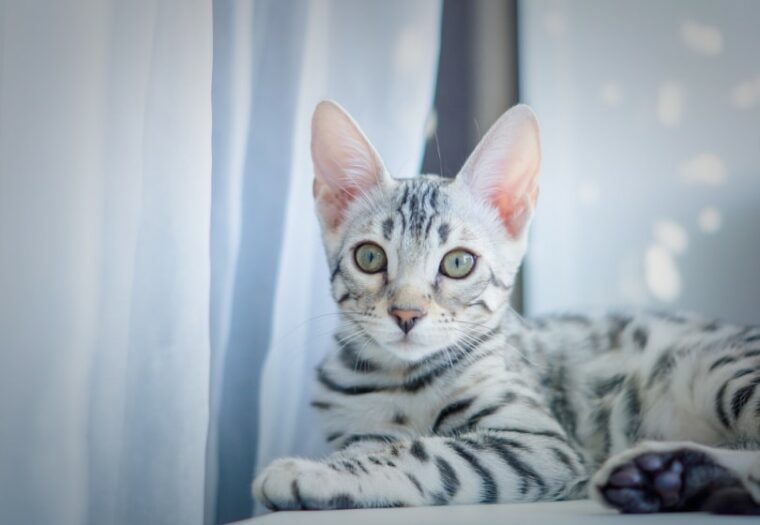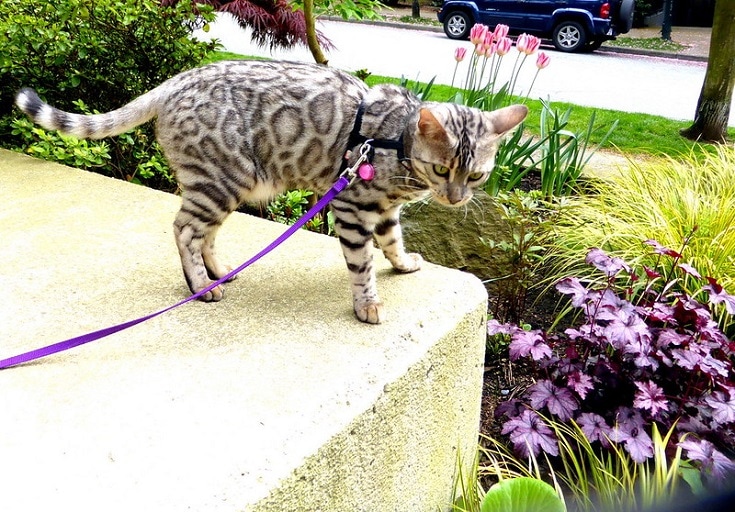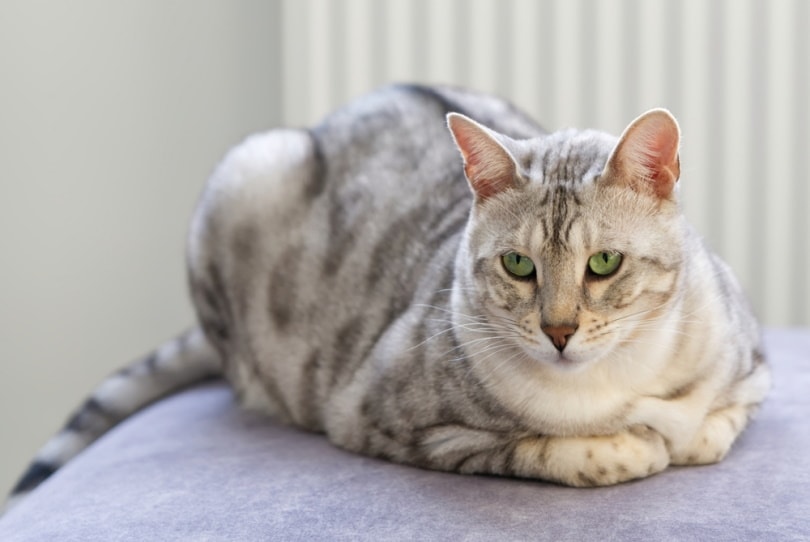
Click to Skip Ahead
Bengal cats are known for their unusual markings and striking appearance. These beautiful cats have the looks of their wild ancestors but the personalities of domestic cats. They are desired for their looks and affectionate, playful natures. Read on to learn more about the Silver Bengal.
Breed Overview
Height:
13 – 16 inches
Weight:
8 – 17 lbs
Lifespan:
10 – 16 years
Colors:
Brown spotted, seal lynx point, sepia, silver, mink
Suitable for:
Experienced cat owners
Temperament:
Intelligent, energetic, playful
Silver is a rare color for this exotic breed. An inhibitory gene is responsible for the silver coat tone of these cats, so professional breeders regard it as a lack of color. The inhibitor gene washes out color by inhibiting the genes that give cats their usual color of coat. If a cat’s coat color is black, it can be washed out to grey by this gene.
Since Bengal cats typically have brown or golden coats, the inhibitor gene will wash out the color to silver. Silver Bengals still carry the genes for brown coats, so two Silver Bengals could produce brown kittens.
Bengal Characteristics
 The Earliest Records of Silver Bengal Cats in History
The Earliest Records of Silver Bengal Cats in History
Bengal cats are a cross between wild Asian Leopard (Prionailurus bengalensis) cats and domestic cats. They have the look of wild cats, with the domestic cat’s size and temperament. A cross between a domestic cat and an Asian Leopard cat was written about in 1889 by Harrison Weir, a British artist known as “The Father of the Cat Fancy.” This cat was mentioned in Weir’s book, “Our Cats and All About Them.” In 1924, a Belgian scientific journal also mentioned this cross. This mixed cat was not yet named a Bengal.
In 1941, a Japanese magazine featured an article about this wild mix cat being kept as a pet. There is no record to indicate that these mixed cats mentioned have contributed to the Bengal breed as we know it today, though.

How Silver Bengal Cats Gained Popularity
In 1960, Jean Sugden Mill began crossing Asian Leopard cats with domestic cats to develop the Bengal cat that we know today. The resulting kittens became popular because people were intrigued with the idea of having a cat that looked wild but acted tame.
In these early years of development, Bengal cats had only brown or golden coats. Silver Bengals did not come around until the 1990s. Judy Sugden, the daughter of Jean Sugden Mill, bred a Bengal cat with a silver domestic cat, believed to be an American Shorthair. Silver Bengals were created, and their unique coat color became highly desired.
Formal Recognition of Silver Bengal Cats
By 1986, The International Cat Association (TICA) accepted Bengal cats as a breed. The Governing Council of the Cat Fancy followed in 1997. The Cat Fancier’s Association accepted the breed in 2016.
However, the original Bengals were brown. Silver Bengals were not created until the 1990s, so they were accepted into the Bengal breed later. In 2004, Silver Bengals were formally recognized by TICA.
Top 5 Unique Facts About Silver Bengal Cats
1. They Are Considered the “Rolls Royce” of Cats
After a woman in London paid $50,000 for her Bengal cat in 1999, the cats were given this nickname.
2. They Are Fully Domesticated Now
Any Bengal cats that you can own today are from later generations. This means you won’t be getting a kitten that directly resulted from a domestic cat bred with an Asian Leopard cat. You’re getting a kitten that is the result of two domestic Bengal cats.
3. They Are Natural Hunters
Bengal cats still retain some of their wild instincts, and one of them is their ability to hunt. These cats have high prey drives and don’t mind water — in fact, some of them actually like it. This means your Bengal should not be trusted around your fish tank. They also should not be left unsupervised with small pets like rabbits, hamsters, guinea pigs, and ferrets.

4. Bengals Aren’t Legal Everywhere
Bengal ownership is restricted or prohibited in some areas. You may need to acquire a special permit in order to have one of these cats. If you’re interested in getting a Bengal, check your local laws for legal ownership information.
5. Bengals Are Smart
A Bengal cat is highly intelligent and able to learn commands and tricks. They can even be trained to walk on a leash. To keep them entertained and busy, challenge them to learn new tricks, solve puzzles, and play games.
 Does a Silver Bengal Cat Make a Good Pet?
Does a Silver Bengal Cat Make a Good Pet?
Silver Bengal cats are different than most other domestic cats. Many people consider cats to be solitary animals, but Bengals crave attention from people. They don’t like to be left alone for long periods. They’re playful and need regular attention from their owners. Ideally, they should have at least an hour of interactive play each day to keep them from getting bored.
Bengals love to climb. The higher, the better for them, so it’s best to have several cat trees or shelves that they can climb on and explore. They are great cats for families that want an affectionate playmate without being excessively wild.
Bengals love water, so you may find your Silver Bengal playing in the sink or trying to join you in the shower. They’re smart cats that can be taught tricks and learn to solve puzzles.
If you’re looking for a Silver Bengal, be sure to find a reputable breeder who puts the health and safety of the cats and kittens first. Since Silver Bengals are rare, they usually carry a higher price tag. Be sure the breeder can provide health documentation from a vet, has their kittens vetted appropriately for their age, and is open and honest with you about the process. You should have all your questions answered and be allowed to see the kittens and parent cats before handing any money over.
Silver Bengals are beautiful cats that make unique and loving pets. Just keep in mind that they differ from most other domestic cats in several ways.
 Conclusion
Conclusion
If you’re ready to welcome a Silver Bengal cat into your home, be ready for a fun, energetic, and loving pet. These beautiful cats are never boring. You’ll want to watch them around small animals, though, because they have high prey drives and are hunters by nature.
While Silver Bengals differ from other domestic cats, they are rewarding to own. Be sure to do your research on a reputable breeder for a kitten or to check Bengal cat rescues in your area to adopt your Silver Bengal.
Featured Image Credit: MaryBog, Shutterstock

 The Earliest Records of Silver Bengal Cats in History
The Earliest Records of Silver Bengal Cats in History



